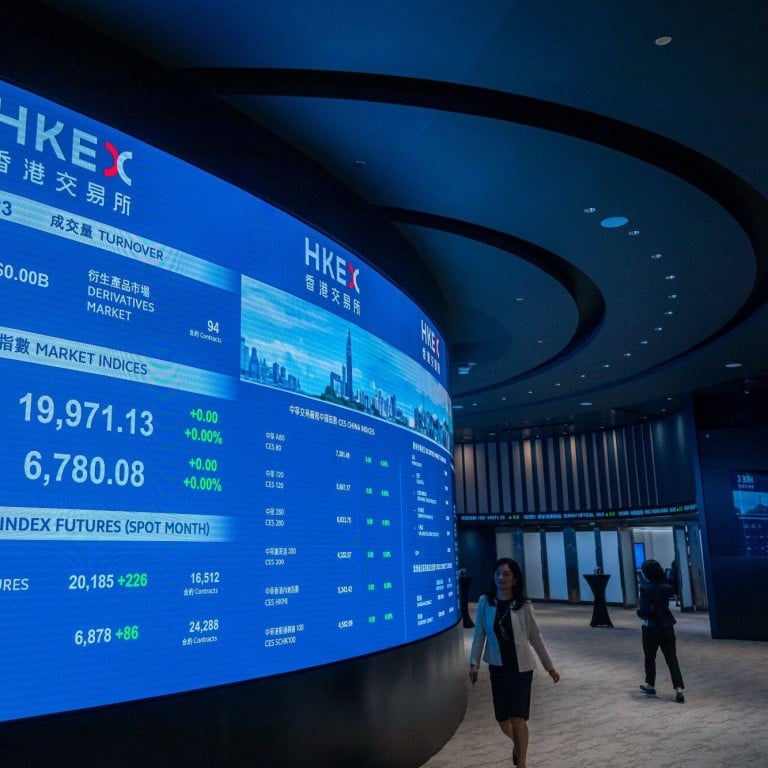Uptick In Chinese Stocks Trading In Hong Kong: Trade Deal Speculation

Table of Contents
Increased Trading Volume in Key Sectors
The heightened trading activity isn't uniform across all sectors. Instead, we're seeing a marked increase in specific areas, indicating targeted investor interest. This surge in trading volume reflects not only broader market sentiment but also sector-specific factors.
-
Quantifiable Increase: Preliminary data suggests a 30% increase in overall trading volume in the last quarter compared to the same period last year, with certain sectors experiencing even more dramatic growth.
-
Leading Stock Performance: Technology stocks have been particularly vibrant, with several prominent Chinese tech companies listed in Hong Kong showing substantial gains. Consumer stocks and financial institutions have also witnessed a notable increase in trading volume.
-
Sector-Specific Drivers: The uptick in technology stocks can be attributed, in part, to positive industry news regarding technological advancements and government support. The increased activity in consumer stocks may reflect growing consumer confidence within China and anticipation of robust holiday sales. Meanwhile, the surge in the financial sector could be driven by expectations of positive regulatory reforms.
The Role of Trade Deal Speculation
Speculation surrounding trade deals, particularly between China and the US, significantly influences investor sentiment and trading activity in Hong Kong. This geopolitical chess game directly impacts the market's trajectory.
-
Positive Trade News = Buying Frenzy: Any positive development in US-China trade negotiations or broader international trade agreements tends to boost market sentiment, leading to increased buying and a rise in stock prices. Investors perceive reduced risk and greater potential for profit.
-
Uncertainty Breeds Volatility: Conversely, negative news or uncertainty surrounding trade talks can trigger widespread selling, leading to market volatility. Investors become risk-averse, opting to secure their profits or reduce exposure.
-
Impact on Specific Sectors: Trade policies directly influence certain sectors more than others. For example, tariffs on specific goods might negatively impact related companies, while trade agreements could open new markets for others.
-
Investor Sentiment & Risk Appetite: The current uptick is fueled by a combination of factors, including improved investor sentiment, a perception of relatively lower risk compared to other markets, and a calculated risk appetite amongst many investors.
Analyzing Investor Behavior
Understanding investor behavior is crucial to interpreting the current market dynamics. Are investors driven primarily by profit potential, or are there other underlying motivations?
-
Investment Strategies: Investors are employing a variety of strategies, from long-term buy-and-hold approaches to short-term day trading. The increased volume suggests a diverse range of investor profiles.
-
Risk Tolerance: While some investors are attracted by the potential for higher returns, the inherent volatility demands a higher risk tolerance. This suggests that a considerable portion of participants are experienced investors comfortable with fluctuating market conditions.
-
Market Analysis & Predictions: The influence of market analysis and predictions is significant. Positive forecasts and expert opinions contribute to the overall optimism and increased trading activity.
Economic Implications and Future Outlook
The increased trading volume of Chinese stocks in Hong Kong carries substantial economic implications for both Hong Kong and mainland China.
-
Impact on Hong Kong's Economy: This activity boosts Hong Kong's financial sector, increasing trading revenue and fostering economic growth. The influx of investment capital further strengthens the city's position as a leading financial hub.
-
Implications for Chinese Economic Growth: The robust performance of Chinese stocks in Hong Kong reflects positively on the overall health of the Chinese economy. Strong stock markets generally signal investor confidence and contribute to economic stability.
-
Future Trading Activity: Predicting future trends is challenging, but the current trajectory suggests continued significant trading activity, especially if positive trade news prevails. However, unexpected geopolitical events or economic shifts could alter this forecast.
-
Potential Risks & Challenges: While the potential rewards are considerable, investors must remain aware of potential risks, including trade war escalations, regulatory changes, and broader global economic instability.
Conclusion
The recent uptick in Chinese stocks trading in Hong Kong is undeniably linked to ongoing trade deal speculation and broader economic factors. This trend has significant implications for both investors and the wider economies of Hong Kong and China. The interplay of positive trade news, investor sentiment, and sector-specific dynamics creates a complex yet fascinating market landscape. To capitalize on the opportunities, while mitigating the risks, careful monitoring of market trends is crucial. We encourage you to stay informed and carefully consider investing in the dynamic Hong Kong market for Chinese stocks, monitoring the trends in Chinese stock trading in Hong Kong closely to make informed investment decisions.

Featured Posts
-
 Saudi Arabia And India To Build Two Joint Oil Refineries
Apr 24, 2025
Saudi Arabia And India To Build Two Joint Oil Refineries
Apr 24, 2025 -
 Trumps Shift On Fed Policy Fuels Us Dollar Surge
Apr 24, 2025
Trumps Shift On Fed Policy Fuels Us Dollar Surge
Apr 24, 2025 -
 Voice Assistant Development Revolutionized Open Ais 2024 Announcement
Apr 24, 2025
Voice Assistant Development Revolutionized Open Ais 2024 Announcement
Apr 24, 2025 -
 Trump Reassures Fed Chair Powells Job Secure
Apr 24, 2025
Trump Reassures Fed Chair Powells Job Secure
Apr 24, 2025 -
 Canadas Conservatives Detail Plan For Tax Cuts And Deficit Control
Apr 24, 2025
Canadas Conservatives Detail Plan For Tax Cuts And Deficit Control
Apr 24, 2025
